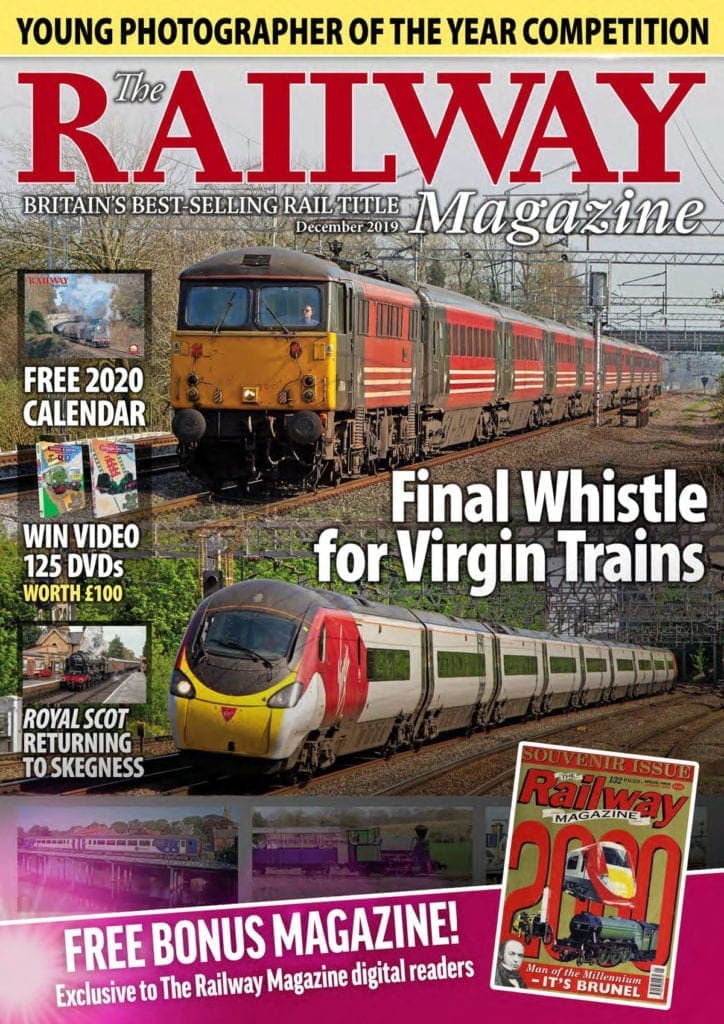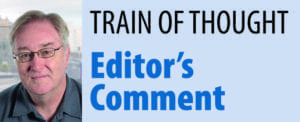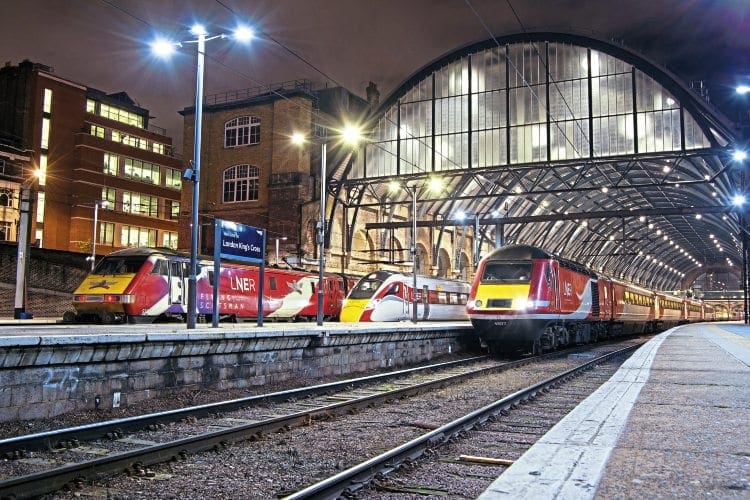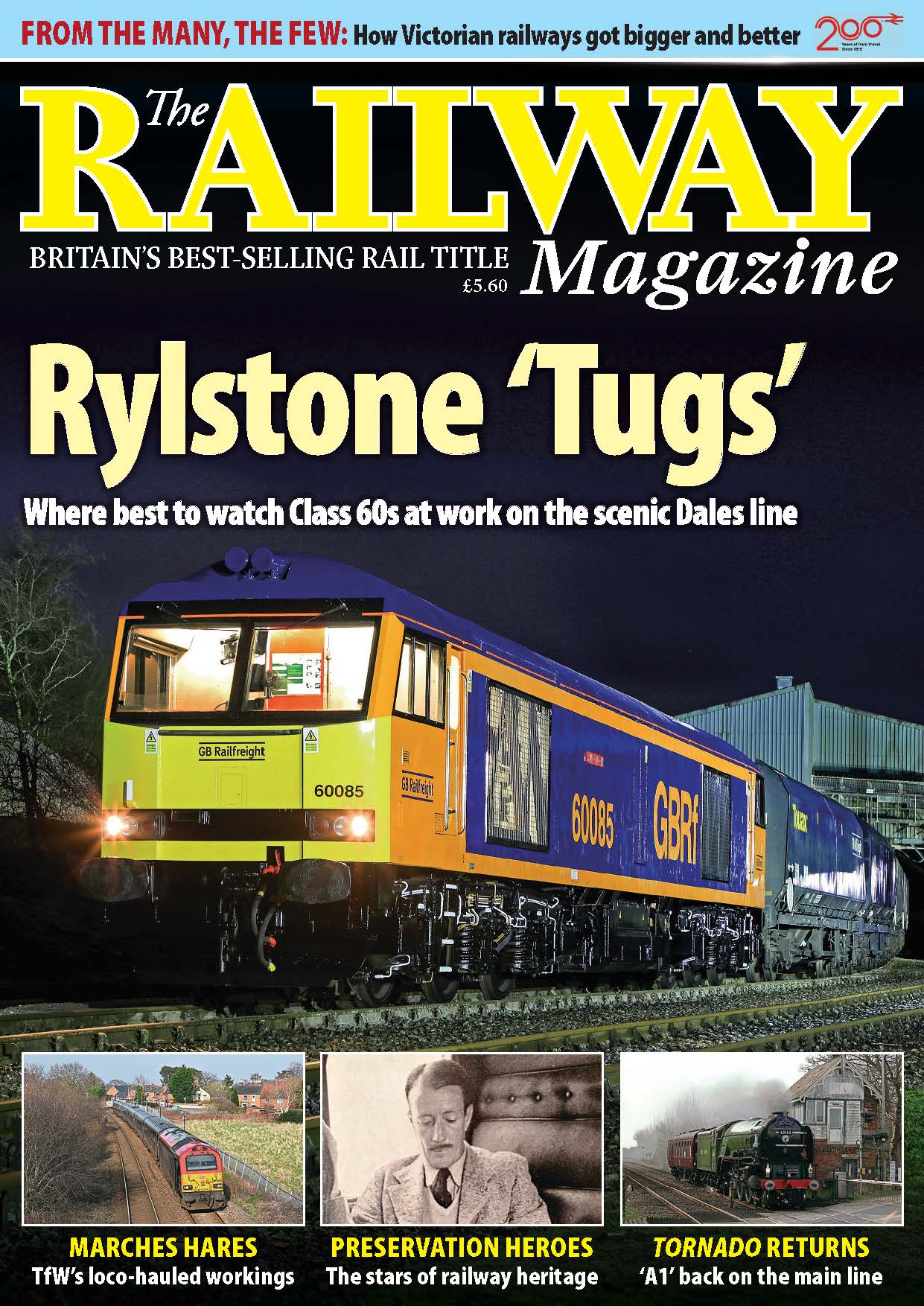Britain’s best-selling rail title The Railway Magazine is back for another month of award-winning photos, news, features and exclusives from the rail industry, past and present.
This month’s The Railway Magazine features an insightful look into the final whistle for Virgin Trains! Plus, see Royal Scot return to Skegness! Also in the November issue:

Headline news
Political parties talk railways ahead of General Election, Royal Scot returning to Skegness, ‘Azuma’ and HST in depot collision, Loughborough ‘Black Five’ back on the main line, GWR plans major timetable changes, ‘Grange’ on target for summer launch, and leaked report backs HS2.
Virgin Requiem
December sees the Virgin Trains name disappear from the British railway network after 23 years. Ben Jones looks back at the company’s highs and lows.
20001: A Southern Odyssey
John Heaton FCILT looks at the work of three Southern Railway electric locomotives and their successors in this month’s Practice & Performance.
PLUS | The Railway Magazine’s monthly news digest covering industrial, steam, Irish, narrow gauge, metro, network, freight and more!
Subscribers to The Railway Magazine can enjoy unlimited access to the publication’s digital archive from as little as £2 per month.
EDITOR INTRO: Modal shift from air to rail gathering pace
NEWS that Virgin Trains’ market share of passengers travelling between Glasgow and London has increased to 29% reflects the gathering pace of the modal shift from air to rail.
The change is no surprise, with more and more business and leisure passengers ‘thinking green’ as part of the drive to de-carbonise.
Rail has the additional benefit of no intrusive security checks, no fog delays, and no extra costs for transport to and from out of town airports.
Rail’s city-centre-to-city-centre credentials are hard to beat, and looking just at key destinations served from London Euston, every one served has seen the number of train services increase by at least 50% since 1997, with journey times reductions, too.
It’s a similar situation across the country, trains carrying more passengers than ever.

Because passengers are genuinely concerned about the environment, especially the volume of emissions emitted by air travel over distances of 200-400 miles compared to rail, this increase is unlikely to reverse in the short term.
The modal shift is not just happening here, but in Europe too as holidaymakers and independent travellers look at green options to reach their destinations, helped by specialist rail websites like seat61.com.
However, if long distance rail services are genuinely going to compete with air, and indeed road, in what is becoming a green challenge, at the risk of repeating myself, additional electrification, including fill-in schemes, must happen as must construction of HS2 and HS3 to create the extra capacity this modal change will bring. Using bi-mode trains is a simply fudge.
Even though one political party is still very much at odds with the idea of HS2, despite it being an electric railway, a new Government could well revise the current thinking on railways and cancel HS2, but instead embark on selective reopenings.

Cancelling HS2 will create more problems than it would solve, limiting passenger growth and future capacity on main lines to the Midlands and the North, and there is also the risk a surge of rail reopenings could lead to pathing problems and the creation of new pinch points on the network.
With reopenings, there is also a problem in places where trackbeds were never protected from new development.
In short, there is no easy answer and no single political party has all the solutions.
Final whistle for Virgin
Just a few days after this issue of The RM is published, the Virgin Trains name will disappear from rail franchising.
Whatever your views on Virgin as an operator, owner Sir Richard Branson, and the idea of rail franchising, what Virgin has achieved in 22 years has been a revelation – and dare I say it could
have been better had there been less franchise micro-management?
Trying to remain impartial, even as a frequent Virgin Trains passenger, when they took over the franchise there were 17 trains an hour to Manchester; now it’s 46. The extra services have actively encouraged increased rail use, and with other enhancements such as the entertainment system Beam and greater use of mobile ticketing, travel has been made easier.
It’s been a privilege to work with many Virgin staff, during which time I’ve been involved with four charity specials, including the September 2006 non-stop Glasgow to Euston record-breaking run of 3hr 55min 27sec, which still stands today.
It’s sad to see Virgin disappear from UK rail, and the professionalism and friendliness of their team members has been outstanding.
Many staff will transfer to the First Trenitalia franchise, and while next month’s issue will cover the launch of this new venture and what the new operator is promising, a recap of Virgin’s tenure of the West Coast Main Line, including the high and low points, appears on p38.
FREE DVD next month from British Pathé
With the January issue is a free DVD of around 60 minutes duration that will look at the some of the unsung heroes from the golden age of steam on Britain’s railways, using footage from British Pathé.

January 2020 issue
THE January 2020 issue will be published on January 3. This is because our normal Wednesday publishing day falls on January 1 (New Year’s Day), which is a bank holiday. Digital subscribers will be able to download the issue from January 2.
The editor and staff wish all readers a very Happy Christmas and a peaceful New Year.


